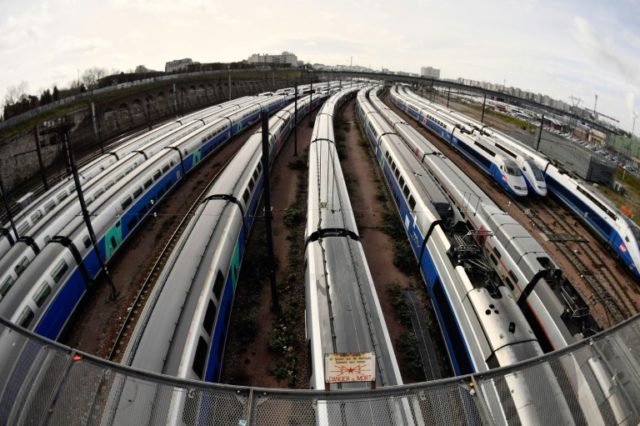Paris (AFP) – Travellers were bracing Saturday for two more days of severe disruptions to train services across France, as unions vowed to pursue their strike over plans to overhaul the debt-laden rail operator SNCF.
The standoff had already caused chaos for the network’s 4.5 million daily passengers this past week as unions kicked off three months of rolling stoppages, when workers will strike for two days out of every five.
The proposed reforms are among the most ambitious of President Emmanuel Macron’s drive to shake up French institutions and boost economic growth.
He says the SNCF must drastically cut operating costs and improve efficiency as EU countries prepare to open passenger rail traffic to competition in the next few years.
Workers fear that if rivals take over lines previously operated by the SNCF, they will lose their job security and many benefits.
They are also protesting a move to deny new hires the job-for-life and early retirement guarantees they enjoy, as well as a corporate restructuring they see as the first step toward privatisation.
Both sides are showing no signs of backing down, with two days of talks last week between unions and Transport Minister Elisabeth Borne failing to make any headway.
“This is a total charade,” Laurent Brun, head of the CGT union’s rail branch, said Thursday after nearly seven hours of talks with Transport Minister Elisabeth Borne.
“The government is ploughing ahead to try to choke us off,” said Roger Dillenseger of the UNSA union, saying the strike “could become much more severe”.
– Battle for public opinion –
Just one in seven or eight high-speed TGV trains were running during the first two days of the rolling strike last week, and only a fifth of regional trains, as more than three-quarters of drivers walked off the job.
Rail unions are hoping to take advantage of a growing atmosphere of social discontent against Macron’s reforms, including strikes and protests by civil servants, energy workers and garbage collectors.
Employees at Air France, in which the government holds a minority stake, resumed their strike Saturday seeking a six percent pay raise, and students have blocked public universities over Macron’s plan to introduce more selective applications.
Many analysts say the chances of any “convergence of struggles” appear remote, given the lack of a common goal among the various groups, but don’t rule it out completely.
“Resentments today are running high, and these social movements can take on a life of their own that unions can’t always control,” said Jean-Marie Pernot, a labour specialist at the Institute for Economic and Social Research (IRES).
So far public opinion appears fairly split on the strike, though analysts say support could grow the longer it lasts.
A survey by the Odoxa polling group published by rightwing daily Le Figaro on Friday found that a slim majority of 51 percent thought the government “should do all it can to avoid this strike, including abandoning certain parts of its reform.
But the survey, taken April 4-5 — on the heels of the first two days of the rolling strikes — also found that 57 percent of respondents felt the strike was “unjustified”.
– ‘Questions’ –
Transport Minister Elisabeth Borne promised Friday to continue talks, saying they have been “useful” though adding she was disappointed that “the unions’ stance hasn’t changed.”
“I can understand that rail workers have questions. I’m here to answer them, even as others are claiming falsehoods,” she told France Info radio.
In the meantime, travellers have been scrambling to make alternative arrangements, with many working at home or turning to carpooling sites.
BlaBlaCar, the market leader for shared rides in France, said demand for spaces in its members’ cars surged tenfold on strike days last week.

COMMENTS
Please let us know if you're having issues with commenting.